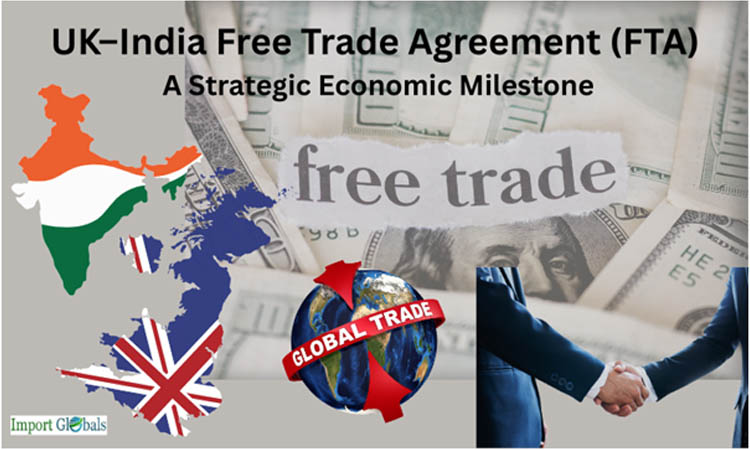
- Sep 13, 2025
UK–India Free Trade Agreement (FTA): A Strategic Economic Milestone
As of July 2025, both countries have completed significant parts of the agreement, even though it has not yet been formally signed. Based on United Kingdom Import Data by Import Globals, the FTA is anticipated to lower tariffs, increase market access for investment, goods, and services, and increase bilateral commerce by billions of dollars annually. This deal might become a pillar of commerce in the twenty-first century, as India pushes for manufacturing and export-led growth and the UK seeks to increase its global trade after Brexit.
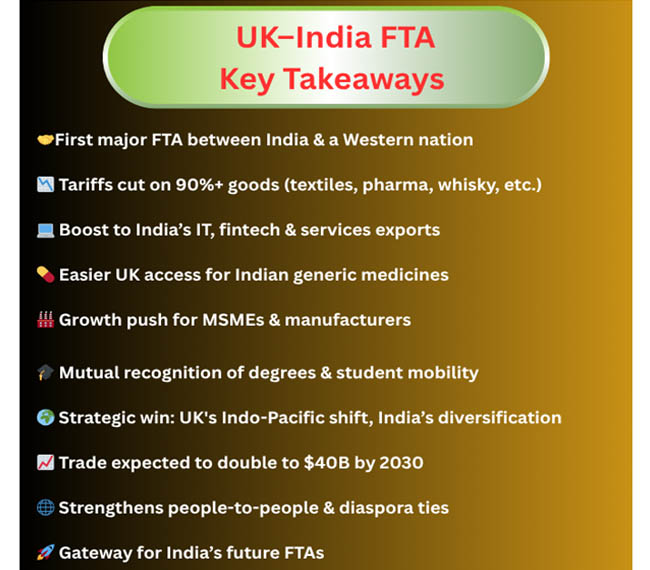
Current Trade Snapshot: The Performance of India-UK Bilateral Trade
India-UK trade has been steadily increasing, rising from USD 16.9 billion in FY2021–2022 to USD 21.3 billion in FY2023–2024. Bilateral trade between India and the UK has steadily increased over the last three fiscal years. As per India Export Data by Import Globals, between FY2021–22 and FY2023–24, the value of traded products and services increased from USD 16.9 billion to USD 21.3 billion, indicating both volume growth and diversification. The trade connection is getting stronger, as seen by the 13.5% year-over-year increase in 2023–2024. This development is expected to continue when the treaty is finalized.
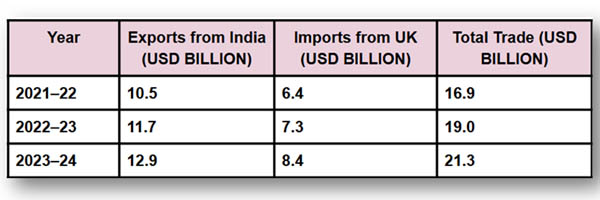
Top Export Sectors from India to the UK
India exports a wide range of goods to the UK in the consumer, industrial, and technology sectors. India's manufacturing and processing economy's mainstays, textiles, pharmaceuticals, and industrial machinery, account for the majority of its exports to the UK. According to India Import Export Trade Data by Import Globals, because of their competitive pricing and adherence to international standards, pharmaceuticals continue to be a stronghold. While textiles and diamonds contribute historic value, the export of electrical equipment and automobile components indicates a rising synergy in industrial collaboration.
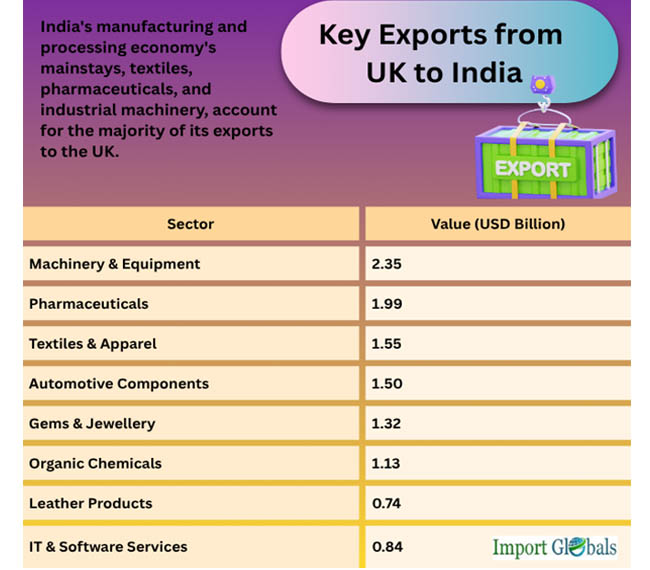
Key Imports from the UK to India
India imports specialized commodities and high-tech products to enhance its indigenous capabilities. As per United Kingdom Import Custom Data by Import Globals, specialized machinery, chemicals, and medical devices, areas where the UK has technological advantages, are among India's major imports from the UK. India's demand for high-end engineering and medical components, sophisticated R&D inputs, and precise tools is reflected in the import trend. These products directly support India's Made in India campaigns and domestic modernization efforts.
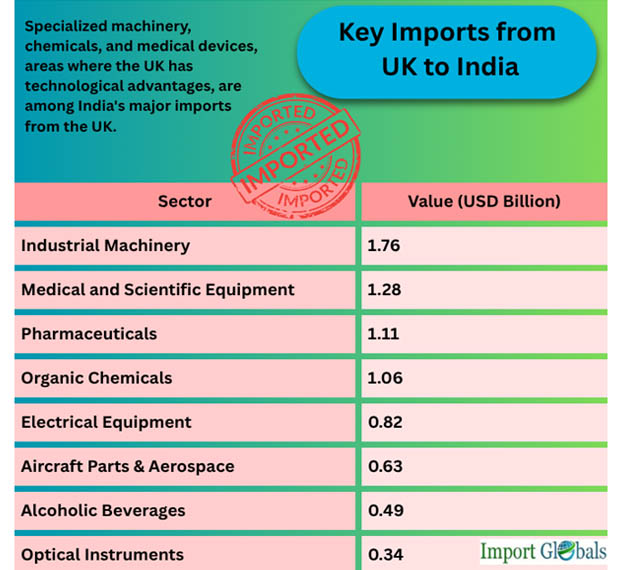
Services Trade and UK Business Presence in India
With a value of about USD 18 billion, the services industry is a vital component of commerce between India and the UK. India's top three service exports to the UK are business process outsourcing, financial services, and IT. In the meantime, as per the United Kingdom Import Trade Analysis by Import Globals, more than 650 UK businesses have operations in India, helping to transfer technology, create jobs, and improve skills. Together, these companies sustain almost 66,000 jobs, demonstrating the positive effects of bilateral investment on human capital.
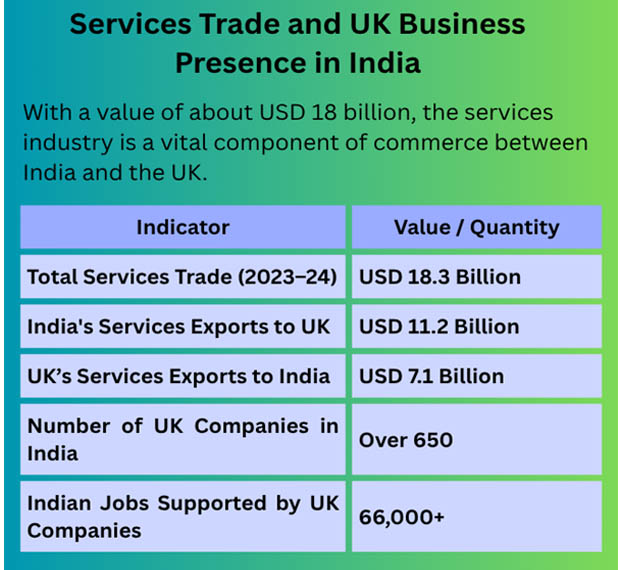
Sectoral Benefits from the UK–India FTA
It is anticipated that the India-UK Free Trade Agreement will yield significant advantages in some economic domains. Based on India Export Data by Import Globals, India's manufacturing, services, and labor capability, as well as the UK's innovation, capital, and advanced technology, are complementary capabilities of both nations. Here is a thorough analysis of the potential benefits for each industry, broken down by sector:
1. Pharmaceuticals & Health Care
Tariff Elimination: With lower tariffs on APIs (Active Pharmaceutical Ingredients) and generic medications, Indian pharmaceutical businesses will have easier and more affordable access to the UK market.
Regulatory Alignment: Based on United Kingdom Import Data by Import Globals, Indian products will have a shorter time to market in the UK thanks to streamlined approval procedures and standardized standards.
Benefits for the UK: Cheap Indian medications might benefit the UK healthcare system by reducing NHS expenses.
2. Textiles and Apparel
Duty-Free Access: The elimination of high UK tariffs, which currently range from 10% to 12%, will help Indian textile exporters and increase the competitiveness of Indian clothing.
SME Boost: Export demand will increase for small and medium-sized textile companies, particularly in centers like Tiruppur, Surat, and Ludhiana.
UK Market Shift: Following Brexit, UK retailers may look to India as a substitute for some imports of EU origin as they look for more affordable suppliers.
3. Automotive Components
Technology Transfer: Based on United Kingdom Import Trade Statistics by Import Globals, advanced UK supply chains and technology may become available to Indian auto component makers.
Lower Input Costs: Indian manufacturers will profit from lower import taxes on specialized machinery and equipment from the UK.
Export Potential: Low-cost component exports to the UK might be increased by Tier-II and Tier-III Indian companies.
4. Information Technology & Digital Services
Visa reforms: This include reciprocal acceptance of qualifications and easier professional mobility, including long-term business visas.
Data Services Expansion: With liberal data localization regulations, Indian IT companies like TCS, Infosys, and Wipro may expand their operations in the UK.
Collaboration in Innovation: Potential for collaborative research and development in cloud computing, AI, cybersecurity, and finance.
5. Agri & Processed Food
Greater Market Access: Tariff reductions and enhanced SPS (sanitary and phytosanitary) collaboration will help India's exports of processed foods, tea, spices, and basmati rice.
Simplification of Certification: At UK ports, streamlined certification and labeling processes will cut down on delays and rejections.
6. Alcohol and Beverages
India's concessions: As per India Import Shipment Data by Import Globals, scotch whisky, which is currently subject to over 100% tariffs, is one of the British alcoholic beverages on which India may reduce duties.
Consumer Growth: More options and lower prices for foreign wines and spirits may be advantageous to wealthy Indian customers.
7. Education
Degree Acknowledgment: Professional accreditation and admittance will be made easier by the mutual acknowledgment of academic credentials.
University Tie-Ups: Increased cooperation, including dual degrees and collaborative programs, between Indian and UK institutions.
Student Mobility: More Indian students would enroll in UK universities if immigration procedures are made simpler and their post-study employment rights are increased.
Strategic Implications of the India–UK FTA
Beyond the sectoral and economic advantages, the India-UK Free Trade Agreement is strategically and geopolitically significant on both a bilateral and international level. Here’s how:
1. Post-Brexit Realignment for the UK
To preserve its influence internationally, the UK has been aggressively pursuing bilateral trade deals since exiting the European Union. An FTA with India, the fifth-largest economy in the world, gives the UK access to a rapidly expanding consumer base and a center for innovation. The agreement reinforces the UK's "Global Britain" agenda and repositions it as a major Indo-Pacific actor.
2. India’s Trade Diversification
As per India Import Export Trade Analysis by Import Globals, India wants to lessen its reliance on established allies like the US and China. This deal helps India balance its economic alliances and diversify its trade portfolio by fortifying relations with a Western country that is not a member of the EU.
3. Investment and Start-up Collaboration
One of the biggest G20 investors in India is the United Kingdom. FDI into industries like fintech, clean energy, AI, and EVs would be further stimulated by the FTA. Joint ventures, UK-based investment, and mentorship possibilities from well-established British companies can all be advantageous to Indian start-ups.
4. Supply Chain Resilience
The agreement will enhance supply chain transparency, customs processes, and logistics. It assists both nations in developing substitutes for supply chains that rely on China in vital sectors like electronics, semiconductors, and pharmaceutical inputs.
5. Soft Power and Diaspora Diplomacy
In the UK, there is a sizable and significant Indian diaspora. Based on United Kingdom Export Import Global Trade Data, through workforce, cultural, and intellectual mobility, this agreement might strengthen interpersonal relationships. It upholds the rule of law, common democratic values, and multilateral cooperation in organizations like the Commonwealth and G20.
6. Strategic Balancing in the Indo-Pacific
A closer India–UK partnership complements broader security collaborations in the Indo-Pacific region. It aligns with India’s “Act East” and “Neighbourhood First” strategies while also enhancing UK’s presence in Asia’s trade and diplomatic corridors.
In Conclusion
Even though final signings are still pending, the UK-India Free Trade Agreement has already shown economic alignment and made noticeable progress. It symbolizes a common goal of development, innovation, and prosperity for both parties, not just a reduction in tariffs. It will serve as a model for contemporary trade diplomacy and be among India's most extensive bilateral free trade agreements if it is completed. Import Globals is a leading data provider of United Kingdom Import Export Trade Data. Subscribe to Import Globals to get more global trade details!
FAQs
Que. Has the UK–India FTA been officially signed yet?
Ans. As of July 2025, the agreement has not yet been officially signed, but most chapters are finalized, and both nations have expressed optimism for closure.
Que. What sectors benefit most from the deal?
Ans. Key beneficiaries include pharma, textiles, engineering goods, IT services, and green technology.
Que. How will the FTA impact consumers?
Ans. Tariff cuts could reduce prices on items like apparel, UK wines, and pharmaceuticals for consumers in both countries.
Que. Will UK companies find it easier to invest in India?
Ans. Yes. The FTA includes provisions for easier market access, dispute resolution, and reduced compliance burdens.
Que. Where can you obtain detailed United Kingdom Import Export Global Data?
Ans. Visit www.importglobals.com or email info@importglobals.com for more information on up-to-date data.
